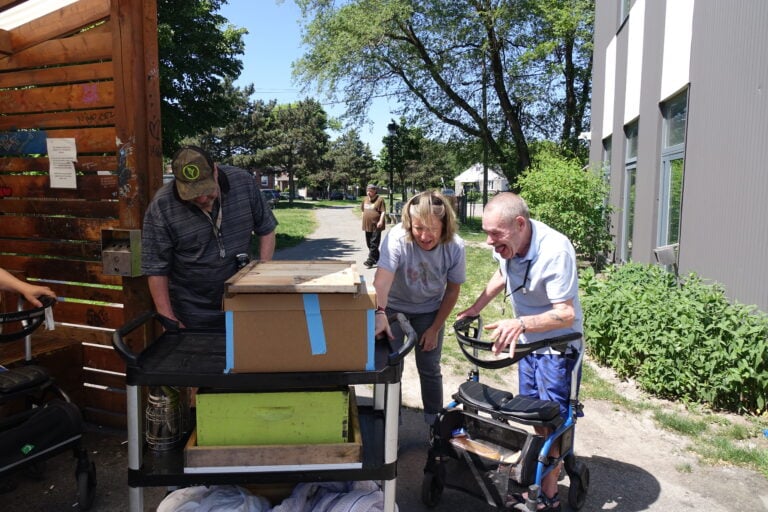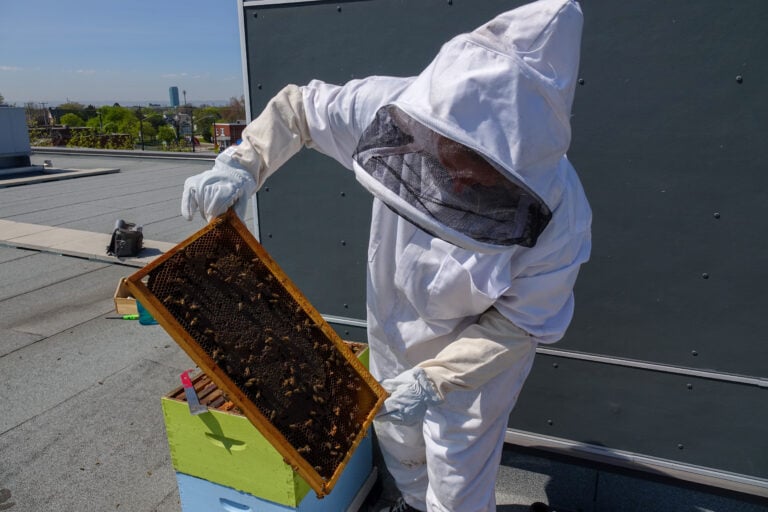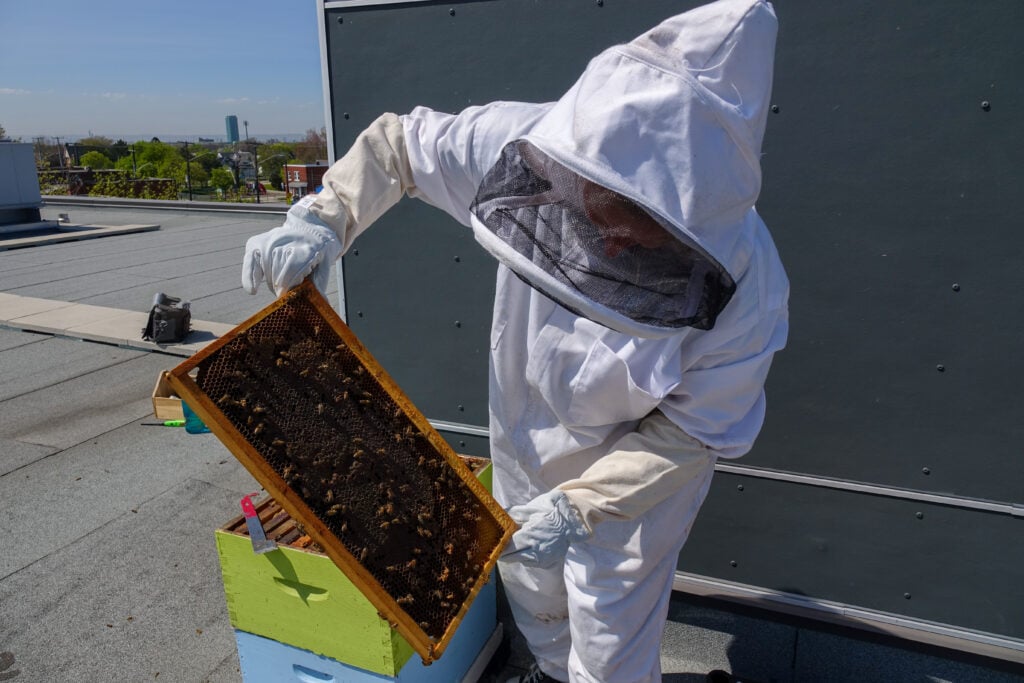While Canada’s housing crisis and homelessness are top of mind for many, I doubt most people associate the solution with “honeybees.” But here in Hamilton, Ontario, one of Indwell’s supportive housing buildings, Strathearne Suites, has hosted beehives on its roof since 2021.

The hives were the brainchild of Regional Manager Jess Brand, whose passion for integrating nature into our city’s ecosystem led to their installation. As Indwell’s Communications Coordinator — and a former cook at Strathearne Suites — I was excited to learn more. So, I put on a big white suit and followed Jess onto the roof to witness the introduction of a new colony.
As she carefully placed the buzzing frames into the wooden hives, I was struck by how much these bees need the same things as the people who live in Indwell’s supportive, affordable housing.
First, they need shelter and food. The trees surrounding Strathearne Suites provide ample pollen, which the bees transform into honey. I had always assumed bees required specific flowers, but Jess explained that they’re more resourceful than I thought! In the words of Jess, they’ll take pollen wherever they can find it, even in the relatively concrete landscape of East Hamilton.
They also rely on one another. Jess pointed out the worker bees, drones, and the queen, each with a role to help the colony thrive. She even showed me “nurse bees” caring for the younger bees.
"Suddenly they were talking and chatting and asking questions, coming alive like a buzzing hive. In that moment, they weren’t just connecting with Jess and each other — they were forming a new connection with the natural world."
Indwell operates on a similar principle: every person needs health, wellness, and belonging to thrive. Just as the bees support their colony, people in our programs benefit from on-site nurses, housing support staff, social workers, addiction support staff, and many others who help them maintain their housing, mental health, and well-being.
And, like all of us, people need connection. As Jess wheeled the new hives over to a group of tenants chatting outside, their faces lit up with curiosity. Suddenly they were talking and chatting and asking questions, coming alive like a buzzing hive. In that moment, they weren’t just connecting with Jess and each other — they were forming a new connection with the natural world.
After settling the new colony into their home, I had the chance to interview Jess on the roof. Here’s what she had to say.

(Interview conducted in Spring, 2024)
Terri: What gave you the idea to first have bees at an affordable, supportive housing program?
Jess: I was a beekeeper, and I’m always looking for ways to engage people in the things that I love. Beekeeping is like an all mind, all body experience. It’s really meaningful, you learn so much, and it’s a peaceful thing to do too.
I wanted to find a way to extend that to the communities that I care about. In Strathearne, at that time, it was COVID. Things were really, really tough and the location is really good for bees. It was this combination of “What’s something that brings some joy?” and “Where’s a space that I can do that?”
This roof is incredible — all of the green space, all the trees that you can see just really lends itself to that.
We also have tenants here who, when they learned that I was a beekeeper, were fascinated by it.
Some folks have been beekeepers in their past. They remember doing bees in childhood. One of our tenants was a beekeeper. It’s a way to do something meaningful in a community that they care about.
Terri: How do you see it benefiting tenants now?
Jess: I think life is hard. And something like bees making honey is one of the small joys of life. And the small joys are the big joys. Every time I come, I try to engage with the tenants. They’re interested in what’s going on, whether it’s the honey or the insects themselves or facts about bees or the fact that I’m wearing a strange white suit — it engages people.
It gives people something to talk about besides some of the things that otherwise dominate our lives and the things that are more difficult. This is really grounding. It’s that grounding experience, something different to do, something to learn, something to teach each other about.
I put up signs that talk about the difference between wasps and bees. And our tenants will then teach the people who come around them the difference. That’s just fun.
Terri: What happens to the honey?
Jess: Every tenant in the building gets a small jar of honey every time we do a harvest. We also have been able to give some to our donor community.
This beehive setup that we’re doing this year was catalyzed by a Gift of Hope. We want to make sure that that gift of hope is recognized and honoured, because it’s a really life giving thing.
When we do the honey harvest, we get our tenants together to spin as much of it as they can. It’s really physically demanding work. I’ve discovered that that’s something that we really need to share. Tenants get to be part of as much of the process as we can. At minimum, everyone gets one jar of honey.
Terri: How do you see it making a positive impact, having something this natural in the middle of East Hamilton?
Jess: This is part of our gritty city, right? And we’re a part of that gritty city, but it’s a gritty city that has so much life. And when we can take those things that are maybe harder, like the steel mills and some of the steam or pollution that we see rising from smokestacks, and you combine that with the natural world and, actually, we can coexist.
We need things like bees and some of the other pollinators that are more natural. Coexistence of life — that’s the healthiest way.
And this is happening all over the city. This is not the only space that there are bees. I heard somebody else did it. And I was like, that sounds amazing. We’re going to do that here.
One of the ways that I think about life is through a lens of stubborn joy — finding ways to bring joy to help us get through the difficult things. I feel like honeybees in the midst of a gritty city, in the centre of lives that are sometimes challenging — this is stubborn joy. This is what life is about.
You can watch a video version of this interview here:



